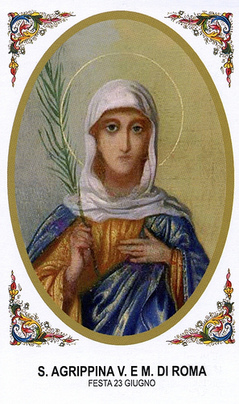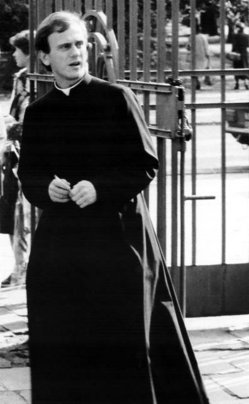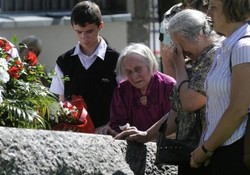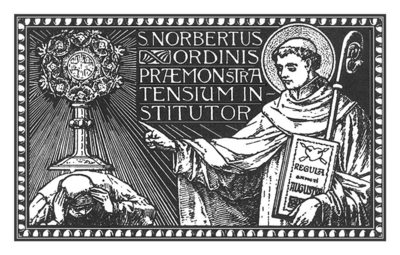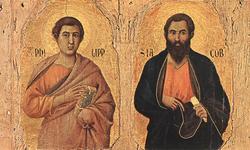With Your blood, O Christ, far beyond all price,
Tag: saint
Saint Romuald
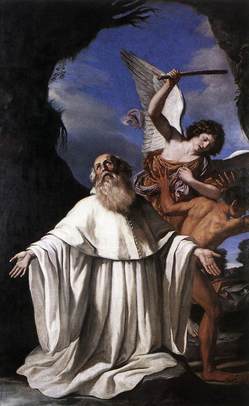 All that I seek to know on earth is Christ,
All that I seek to know on earth is Christ,
The power of his resurrected life,
To share the suff’rings that he bore for me,
Thus shall I triumph over death and strife.
So Romuald, the solitary man,
Became a living icon of his Lord,
In prayer and self-denial formed his monks
And molded them within the silent Word.
O Father, Son, and Spirit ever blessed,
We raise our hearts in silence and in praise!
With Romuald and all the heav’nly choir,
We praise you, Lord of Life, for all our days!
J. Michael Thompson
Copyright © 2010, World Library Publications
10 10 10 10
SURSUM CORDA, WOODLANDS
Saint Ephrem the Syrian
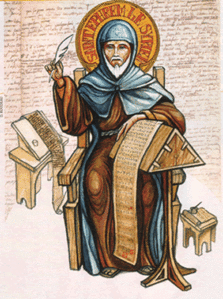 It is indeed fitting to honor the blessed deacon of
It is indeed fitting to honor the blessed deacon of
Edessa for his desire that the preaching of the divine word and the training of
his disciples rest on the purity of Sacred Scripture. He also acquired honor as
a Christian musician and poet. He was so accomplished in both arts that he was
called the “lyre of the Holy Spirit.” From this, Venerable Brothers,
you can learn what arts promote the knowledge of sacred things. Ephrem lived
among people whose nature was attracted by the sweetness of poetry and music.
The heretics of the second century after Christ used these same allurements to
skillfully disseminate their errors. Therefore Ephrem, like youthful David
killing the giant Goliath with his own sword, opposed art with art and clothed
Catholic doctrine in melody and rhythm. These he diligently taught to boys and
girls, so that eventually all the people learned them. In this fashion he not
only renewed the education of the faithful in Christian doctrine and supported
their piety with the spirit of the sacred liturgy, but also happily kept
creeping heresy at bay.
to sacred matters as Theodoretus stresses. The metric rhythm, which our saint
popularized, was widely propagated both among the Greeks and the Latins. Indeed
does it seem probable that the liturgical antiphonary with its songs and
processions, introduced at Constantinople in the works of Chrysostom and at
Milan by Ambrose (whence it spread throughout all of Italy), was the work of
some other author? For the “custom of Eastern rhythm” deeply moved
the catechumen Augustine in northern Italy; Gregory the Great improved it and
we use it in a more advanced form. Critics acknowledge that that “same
Eastern rhythm” had it origins in Ephrem’s Syrian antiphonary.
wonder then that many of the Fathers of the Church stress the authority of St.
Ephrem. Nyssenus says of his writings, “Studying the Old and New
Scriptures most thoroughly, he interpreted them accurately, word for word; and
what was hidden and concealed, from the very creation of the world to the last
book of grace, he illumined with commentaries, using the light of the
Spirit.” And Chrysostom: “The great Ephrem is scourge of the
slothful, consoler of the afflicted, educator, instructor and exhorter of
youth, mirror of monks, leader of penitents, goad and sting of heretics,
reservoir of virtues, and the home and lodging of the Holy Spirit.” Certainly
nothing greater can be said in praise of a man who, however, seemed so small in
his own eyes that he claimed to be the least of all and a most vile sinner”
(12-14).
Pope Benedict XV
Principi
Apostolorum Petro (On St. Ephrem the Syrian), 5 October 1920
Blessed Jerzy Popiełuszko, martyr
From Cyprus on Sunday, June 6, 2010, Pope Benedict XVI
during the Angelus address spoke a “few words in Polish on the happy occasion
of the beatification today of Jerzy Popieluszko, priest and martyr: [I send
cordial greetings to the Church in Poland which today rejoices at the elevation
to the altars of Father Jerzy Popieluszko. His zealous service and his
martyrdom are a special sign of the victory of good over evil. May his example
and his intercession nourish the zeal of priests and enkindle the faithful with
love.]”
Saint Norbert of Xanten
Causing souls to flourish.
J. Michael Thompson
Copyright © 2010, World Library Publications
76 76 D, ST. KEVIN, AVE VIRGO VIRGINUM
Saint Charles Lwanga & companions, Martyrs of Uganda
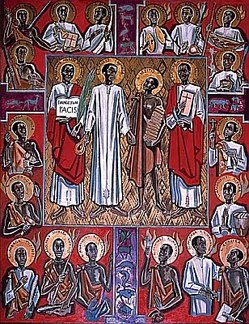 Today’s the liturgical memorial of some of the most evocative witnesses to Jesus Christ who gave their lives for the Christian Faith of the 19th century. I pray that Saint Charles and companions intercede not only for Africa but for all who claim the Church as mother and family and who find it difficult to truly live their faith. More on Saint Charles here.
Today’s the liturgical memorial of some of the most evocative witnesses to Jesus Christ who gave their lives for the Christian Faith of the 19th century. I pray that Saint Charles and companions intercede not only for Africa but for all who claim the Church as mother and family and who find it difficult to truly live their faith. More on Saint Charles here.
Saint Damien de Veuster (of Molokai)
![]() Father of mercy, in Saint Damien You have given us a
Father of mercy, in Saint Damien You have given us a
shining witness of love for the poorest and most abandoned. Grant that, by his
intercession, as a faithful witnesses of the Heart of Your Son Jesus, we too
may be servants of the most needy and rejected.
Blessed Gregory Frackowiak, Society of the Divine Word
Gregory Frackowiak was the youngest of our four martyrs was 31 when he was beheaded
on May 5, 1943, in the prison of Dresden. Brother Gregory consciously offered
his life as a substitute for others [does this sound the Law of the Gift spoken of my Jesus and recalled often by Pope John Paul II?]. His willingness to claim responsibility
for some thing he did not do saved several people (including his brother) from
certain imprisonment and death. This heroic gesture makes him similar to
another martyr of the same war — St. Maximilian Kolbe, who also gave his life
for someone else in the concentration camp at Auschwitz.
Gregory is his
religious name. He was born Boleslaw Frackowiak in Lowecice (a small village
not far from Poznan). One of twelve children, he grew up in a deeply religious
atmosphere. At the age of 18 he entered the Society of the Divine Word (SVD) novitiate in Gorna Grupa. From the beginning he exhibited great joy in being a
missionary Brother. He worked both as a receptionist and as a professional
binder in the printing press. Among the people of the area he was remembered as
someone with a special sensitivity towards the poor. He had numerous visitors,
because he was known for providing something to eat, a warm welcome, and a good
word for everyone. Some called him “the friend of the poor.”
His gentleness,
simplicity, and deep spirituality were also appreciated by the students of the
minor seminary, who enjoyed his presence and sought his advice. His work as a
bookbinder in the printing press was acknowledged as exemplary by both lay
employees and by the confreres. When Brother Gregory professed his final vows
on September 8, 1938, he was deeply convinced that he was offering his life to
God for the mission of Christ and of the Church. He had no idea how quickly and
how radically he would be expected to live out that commitment.
When World War
II began, Brother Gregory was part of the SVD community in Gorna Grupa. When
this house was made an internment camp for priests, the brothers were forced to
leave. For a while he lived with relatives in Poznan. There he served as the
sacristan at St. Martin’s Parish. He also taught catechism to children and even
baptized some of the newborn. One day the pastor was arrested by the Gestapo.
Since he could no longer safely hide the Blessed Sacrament, Brother Gregory
took upon himself the task of distributing it among the faithful. For an entire
day and night he and others in the parish knelt in adoration before the Blessed
Sacrament. Then with great reverence he distributed Holy Communion to those
present.
Eventually Brother Gregory was able to find work in a printing press
at Jarocin, a small town not far from his home. Like many others, he received
and passed on some anti-Nazi material. However, Fr. Paul Kiczka, SVD, advised
him to discontinue receiving and passing on these pamphlets, and so he stopped.
A year later these activities were discovered by the Gestapo.
Among those
arrested were men who had wives and children. Wouldn’t the others be saved if
he took on himself the whole responsibility for this anti-Nazi activity? “May I
accept the responsibility for them?” he asked his spiritual director. Fr.
Kiczka responded: “If you have the courage and strength. It would mean
sacrificing your life.” Gregory made his confession and received Holy
Communion. After his thanksgiving he shook his confrere’s hand and said, “Till
we meet again — but not on this earth.” He went home, where he was arrested the
following day. He “confessed” his crime, and immediately afterwards some of the
other suspects were freed. Gregory was transferred from the prison in Jarocin
to Poznan and then finally to Dresden, where he was beheaded.
A few hours
before his death Gregory wrote to his relatives. A few sentences from that
letter reveal his readiness for death: “I am writing to you for the last time
in this world. By the time you receive this letter I will no longer be among
the living. Today on Wednesday (5.5.1943) at 6:15 PM I will be executed. Please
pray for me. It is already one o’clock, and at two o’clock the priest will
bring me Jesus. Don’t cry, but pray for my soul. I leave it to you, whether you
want to communicate to my mother the manner of my death. I am completely at
peace. I greet all of you, and I will wait for you in God’s presence. Please
greet all the Missionary Brothers in Bruczkow. After the war bring my cassock
there. God bless you. Remain faithful Catholics. Forgive any faults of mine.
I’m sorry for my poor mother. May God protect you. Till we see each other in
heaven.”
Blessed Gregory Frackowiak was beatified by Pope John Paul II on June
13, 1999, together with three companions from the Society of the Divine Word,
as part of a group of 107 Polish martyrs of the Second World War.
This
biography provided by the Society of the Divine Word, this religious congregation out if you think you have a vocation. We need more Blessed Gregorys….
Saints Philip and James; Cardinal O’Connor remembered
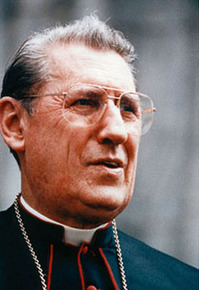 Today, we also remember the soul of John Joseph Cardinal O’Connor, PhD, archbishop of New York, 1984-2000. He died 10 years ago today.
Today, we also remember the soul of John Joseph Cardinal O’Connor, PhD, archbishop of New York, 1984-2000. He died 10 years ago today.
Blessed Pauline von Mallinckrodt
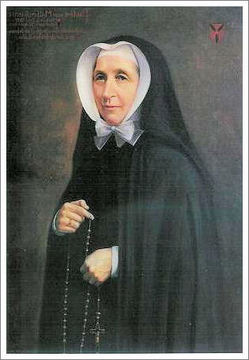 In her retreat of 1843, Blessed Pauline von Mallinckrodt wrote in her notes,
In her retreat of 1843, Blessed Pauline von Mallinckrodt wrote in her notes,
